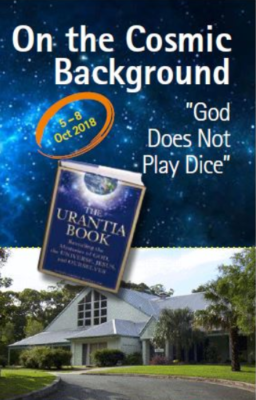 On the Cosmic Background: “God Does Not Play Dice”
On the Cosmic Background: “God Does Not Play Dice”
If you haven’t registered yet, there’s still space available at ANZURA’s upcoming annual conference that’s being held on the Sunshine Coast of Queensland, Australia 5 – 8 October 2018.
THEME UPDATE
The theme for this conference is inspired by that ever-topical question by Albert Einstein, “Does God play dice with the universe?” which was raised in response to scientific developments that were playing out even as The Urantia Book was coming together. Remarkably, the prevalent materialism of contemporary science was dissipating just as The Urantia Book was urging that it should. What follows is a preview of where such lines of thought might take us during the conference.
The very general idea that there are unseen background processes operating in the universe is so fundamental that it is practically a background process to thought itself, implicit in all religion and God concepts from their most primitive superstitious or “ghost-fear” origins. Indeed, it is only in the last few centuries that a few philosophies and sciences managed to distance themselves and to defend a materialistic position whereby reality is held to be no more than what is visible or at least measurable.
There is no doubt that science flourished in that well-defined, hard, material reality. But a more mature understanding has developed and in the language of modern science it is allowed that the denial of anything beyond or below ordinary reality imposes an unnecessary constraint that was never certain anyway. Put bluntly we don’t mind if other “things” are going on so long as they stay insignificant compared to the precision of our experiments.
Science was able to take a holiday of sorts from deeper concerns but that relaxing time couldn’t last. For one thing, when astronomy began to count stars by the billion and distances by the light-year the goose-bumps and that niggling ghost-fear feeling returned. For another, some experiments became so subtle that “things” from the cosmic background were being picked up, too significant to ignore and far too interesting.
On one level, the engineering level, such subtle, so-called quantum phenomena are now understood very well, and they serve us routinely in every solid-state electronic device. On another level, more to do with mind than nature, we continue to wonder at how a measurable particle in one state of being can jump into another state of being without revealing any clue as to what happens in between, as if tantalizingly just outside our reality.
If God is hiding, then here is where he might be. If God is interacting directly with the material world then here is how he might be doing it. If there is free will then the apparent randomness of quantum phenomena is what it might look like. If mind has a role in evolution then here is where ordinary, accidental-looking randomness can transition into purpose.
The human mind evidently delights in perceiving both the strangeness of this inner universe and the vastness of the outer universe, an observation both obvious and packed with meaning such that Roger Penrose even used the phrase, “The Large, the Small and the Human Mind” as a book title.
Perhaps our understanding will make a quantum jump to an inclusive state encompassing physical knowledge and a wealth of other possibilities including God and omnipresence and free will and randomness and purpose. This is a state encouraged by study of The Urantia Book and I hope our conference will take us there in some measure also.
